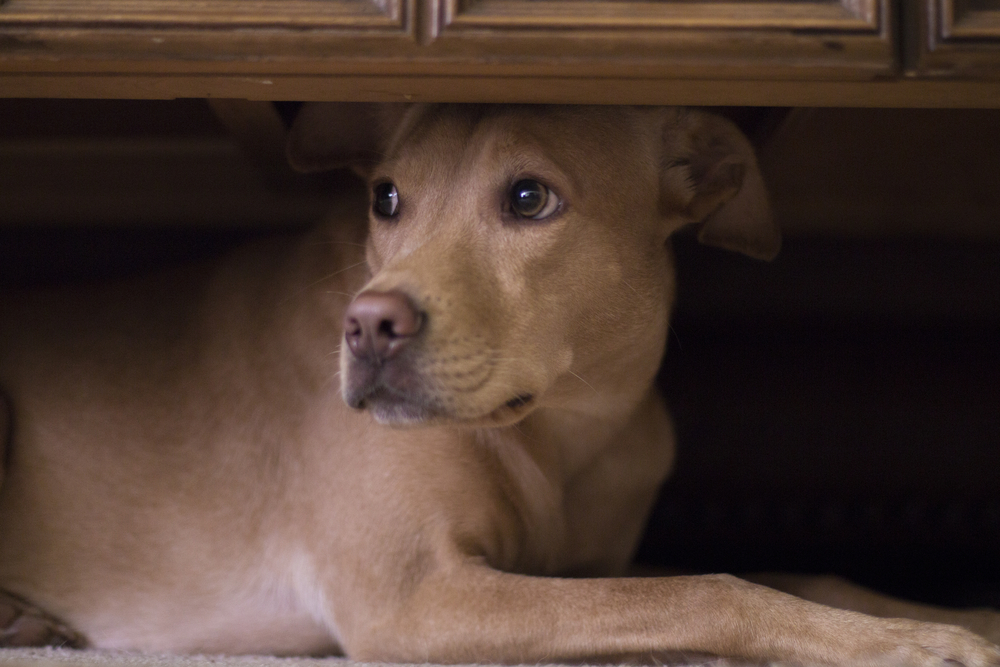Having a deaf or hearing-impaired dog can be challenging because the ways that many owners communicate with their pets involve sound. It’s not always easy to tell if your dog is having a hearing problem either, especially if it starts gradually. If you think that your dog might be struggling to hear but aren’t sure, read on for a list of the signs to look for, so you can report them to your vet.

The 9 Signs That Your Dog Might Be Deaf
1. Not Responding to Noise
The easiest and often the first clue that your dog is experiencing hearing loss or deafness is that they don’t respond to loud noises like other dogs do. They may also not respond to your commands and may not come when you call them. Like humans, they may lose the ability to hear high-pitched sounds first, so they may stop responding to your whistle, the doorbell, or birds before they start seemingly ignoring other sounds.

2. Sleeping More Often
A common sign of a hearing problem in dogs is that they sleep more than other dogs do. This additional sleep is likely due to them not being woken up by loud noises, so they can get into a deeper sleep that lasts longer. Without the many common sounds that usually capture your dog’s interest throughout the day, they can become bored, which might also lead to more frequent naps.
3. Being More Easily Startled
If your dog is deaf or otherwise not hearing well, they are likely easily startled, which might lead to aggressive behavior. If your dog can’t hear, sneaking up behind them or waking them when they are sleeping can lead to an unexpected, even violent reaction, similar to what a person might do if someone suddenly jumped out from behind a wall and yelled, “Boo!” at them.

4. Shaking Their Head Constantly
Consistent head shaking could be a sign that your pet is losing their hearing. Your dog may feel like one or both of their ears are blocked with water or wax and may be shaking their head to try to remove it. However, since water or wax isn’t the problem, your dog might continue to do it relentlessly.
5. Tilting Their Head
Any long-time owner will tell you that dogs often tilt their heads when they are confused or don’t understand something. You will typically notice it when you are talking to them. If you see this behavior suddenly becoming more frequent, it could be a sign that your dog is struggling to hear you.

6. Not Exhibiting Ear Movement
Dogs continuously move their ears around to determine which direction different noises are coming from. If you notice a lack of movement in your dog’s ears, especially when loud noises occur, it could be a sign that they can’t hear those sounds.
7. Barking Loudly
If your dog can’t hear well, there is a good chance that they will bark more frequently than usual. They may also start to bark louder than normal since they can’t hear themselves or they are trying to do so. If the loud barking begins out of nowhere, it could be a sign that they have started losing their hearing.

8. Scratching Their Ears Frequently
Similar to the way that your dog might shake their head to remove what they think is water or wax, they might also start to paw or scratch at their ears to remove the “blockage.” This can result in them scratching or pawing continuously, since they can’t actually get rid of it.
9. Having Poor Hearing Test Scores
The best way to find out if your dog has a hearing issue is to schedule an appointment with your vet for them to take the Brainstem Auditory Evoked Response (BAER) test. It detects electrical activity in the dog’s ear, which can help them determine if electrical signals are traveling from the ear to the brain. A lack of these signals means that the dog cannot hear. This non-invasive test usually takes 10–15 minutes.

 What Should I Do If I Think That My Dog Is Losing Their Hearing?
What Should I Do If I Think That My Dog Is Losing Their Hearing?
- Stay calm and don’t jump to conclusions, as many of these signs might also mean something else. For instance, an ear infection is a common reason that dogs scratch or paw at their ears, which doesn’t have anything to do with hearing loss.
- Keep detailed records of things that you notice and any events that can help you explain the issue to your vet more completely.
- Run simple hearing tests at home, which can include clapping your hands, speaking commands, or making another noise while standing behind your dog’s back.
- Visit your vet to discuss your pet’s signs and schedule a hearing exam.
If you need to speak with a vet but can't get to one, head over to PangoVet. It's our online service where you can talk to a vet online and get the advice you need for your dog — all at an affordable price!
Why Do Dogs Lose Their Hearing?
1. Congenital Deafness
Congenital deafness is a genetic condition that comes from a dog’s ancestors, and it is especially prevalent in dogs with white coats, as the same genes are responsible for both in many species. Dogs prone to hearing loss include Dalmatians, Australian Shepherds, Great Danes, and Welsh Corgis.

2. Old Age
Your dog can lose their hearing as they age just like humans do, and it will usually start with the high frequencies.
3. Ear Infections
Repeated or severe ear infections can lead to the formation of scar tissue, which can narrow the ear canal and damage the inner and middle ear, leading to temporary or permanent hearing loss.
4. Trauma or Injury
Physical damage to your dog’s ear, ear, or head or even loud noises, such as an explosion, can cause temporary or permanent hearing loss.
5. Blockages
The accumulation of wax and other debris can lead to difficulty hearing and signs that resemble hearing loss. Fortunately, frequent ear cleaning can help reduce the chances of a blockage becoming a problem.


Living With a Hearing-Impaired Dog
- Replace your verbal commands with hand gestures. You can use the same process that you’d use to train a non-hearing-impaired dog to teach yours, including using simple hand gestures for each of the commands that they need to learn.
- Use a flashing light to get their attention when you need to without startling them. Vibrating (not shocking) collars can also work well.
- Ensure that your living space doesn’t have any dangers for hearing-impaired dogs. Fence in your yard so they won’t run off if they get startled. If there are dangerous areas in the house, a baby gate can be a great way to block off these locations when you can’t supervise your dog.
- Always use a leash or harness when outside to keep your dog safe from hazards that they can’t hear, like approaching vehicles.
- Establish a consistent daily schedule for feeding, walks, and playtime to provide a sense of security and reduce anxiety.
- Inform visitors to your home that your dog is hearing impaired and requires special treatment, to reduce the risk that they will startle your pet.
- Join online forums, social media groups, or local clubs for owners of hearing-impaired dogs to get support for yourself and your family members and provide it to others in the same situation.
- Remember that with a few simple modifications to their daily routine, your dog can live a long and happy life while being hearing impaired.
 Summary
Summary
Signs that your dog might be deaf include not paying attention to your commands, not coming when you call them, and not noticing loud noises that often bother other dogs. You may also notice your dog sleeping more than usual, and they may frequently shake or paw at their ears. Head shaking and head tilting are also common.
Since many of these signs can indicate another problem, such as an ear infection, schedule an appointment with your vet immediately so you can determine the real cause. They may schedule a BAER test, which can verify for sure if your pet is suffering from hearing loss and how far along it is.
See also:
Featured Image Credit: KAZLOVA-IRYNA, Shutterstock






















